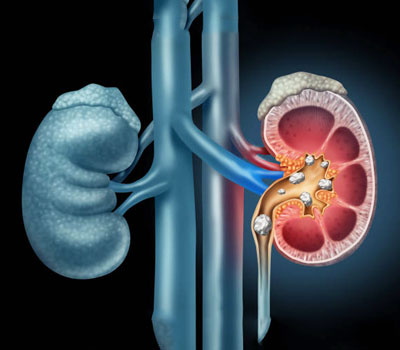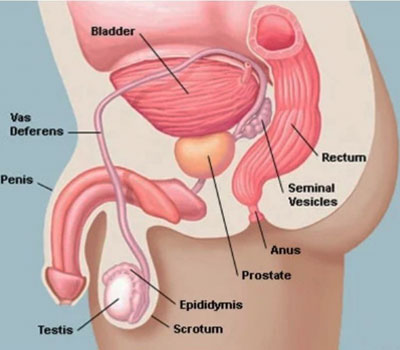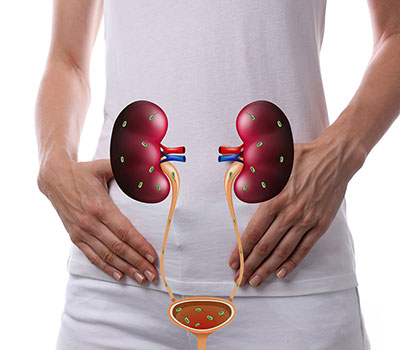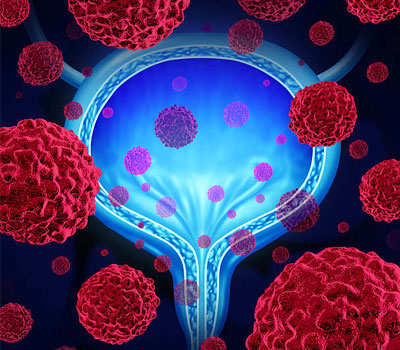-
Ramanthapur, Hyderabad, Telangana
-
-
+91 93470 45609, +91 63029 90413
-
Kidney Stone
A kidney stone is one of those ailments that you cannot leave to heal on its own. A person suffering from these pesky stones has to undergo medical treatment sooner or later. The sooner, the better is the right approach for kidney stone treatment. As much as it is necessary to undergo proper treatment for kidney stones, a number of other aspects of treatment also play a key role in choosing the right healthcare provider for the treatment. Affordability of the treatment is one of the key factors to consider while going for any surgical treatment option. Surgical treatments are, of course, a little on the expensive side. But a well-researched choice can save you from paying large amounts for your kidney stone treatment in Hyderabad. Let us quickly give you an estimate of the kidney stone treatment expenses in Hyderabad.
Are You Suffering from these Kidney stones Book An Appointment
-
Prostate Treatment
In men, the prostate gland is located at the base of the urinary bladder. This gland enlarges with age, a condition known as benign prostatic hypertrophy (BPH). Cancer in this gland is extremely rare. This is typically a disease of advanced age (>60 years). These are tumors that grow very slowly. Whether you have early-stage prostate cancer, cancer that has returned after treatment, or a more advanced condition, now you have more options for prostate cancer treatment in Hyderabad. At Anantalakshmi Kidney Multi Speciality Hospital, Dr.Ashok Kumar , one of the top oncologist in Hyderabad, India, can assist you in determining which treatments will give you the best chance of controlling or curing your cancer. Men who receive prostate cancer surgery in Hyderabad from Dr. Ashok Kumar can be confident in the operative results because he is a highly qualified and experienced surgical oncologist.
Are You Suffering from these prostate gland Book An Appointment
-
Stricture Urethra
What is Urethral Stricture Surgery?
Urethral stricture surgery is conducted to treat narrowing of the urethra, the tube-like structure that carries urine from the bladder to other outer parts for urination. The stricture blocks flow of urine, which can lead to a number of urinary tract problems.
Symptoms of Urethral Stricture Surgery
- Pain during urination
- Burning sensation during urination
- Decreased or complete blockage of urine flow
- Urinary tract infection
- Blood in urine
- Darkening of urine
Diagnosis of Urethral Stricture Surgery
- Blood tests
- Imaging tests
- Urine flow-related tests
Are You Suffering from these Stricture Urethra Book An Appointment
-
Urinary Incontinence
Urinary (or bladder) incontinence occurs when you are not able to keep urine from leaking out of your urethra. The urethra is the tube that carries urine out of your body from your bladder. You may leak urine from time to time. Or, you may not be able to hold any urine.
The three main types of urinary incontinence are:
Stress incontinence -- occurs during activities like coughing, sneezing, laughing, or exercise.
Urge incontinence -- occurs as a result of a strong, sudden need to urinate immediately. Then the bladder squeezes and you lose urine. You don't have enough time after you feel the need to Urinate to get to the bathroom before you do urinate.
Overflow incontinence -- occurs when the bladder does not empty and the volume of urine exceeds its capacity. This leads to dribbling.
Mixed incontinence occurs when you have both stress and urge urinary incontinence.
Bowel incontinence is when you are unable to control the passage of stool. It is not covered in this article.Are You Suffering from these Urinary Incontinence Book An Appointment
-
What is male infertility?
Male infertility is any health issue in a man that lowers the chances of his female partner getting pregnant.
About 13 out of 100 couples can't get pregnant with unprotected sex. There are many causes for infertility in men and women. In over a third of infertility cases, the problem is with the man. This is most often due to problems with his sperm production or with sperm delivery.
What Happens Under Normal Conditions?
The man's body makes tiny cells called sperm. During sex, ejaculation normally delivers the sperm into the woman's body.
The male reproductive system makes, stores, and transports sperm. Chemicals in your body called hormones control this. Sperm and male sex hormone (testosterone) are made in the 2 testicles. The testicles are in the scrotum, a sac of skin below the penis. When the sperm leave the testicles, they go into a tube behind each testicle. This tube is called the epididymis.
Just before ejaculation, the sperm go from the epididymis into another set of tubes. These tubes are called the vas deferens. Each vas deferens leads from the epididymis to behind your bladder in the pelvis. There each vas deferens joins the ejaculatory duct from the seminal vesicle. When you ejaculate, the sperm mix with fluid from the prostate and seminal vesicles. This forms semen. Semen then travels through the urethra and out of the penis.
Male fertility depends on your body making normal sperm and delivering them. The sperm go into the female partner's vagina. The sperm travel through her cervix into her uterus to her fallopian tubes. There, if a sperm and egg meet, fertilization happens.
The system only works when genes, hormone levels and environmental conditions are right.Are You Suffering from these Male Infertility Book An Appointment
-
What is Erectile Dysfunction (ED)?
Erectile dysfunction is defined as the persistent inability to achieve or maintain penile erection sufficient for satisfactory sexual performance. The Massachusetts Male Aging Study surveyed 1,709 men aged 40–70 years between 1987 and 1989 and found there was a total prevalence of erectile dysfunction of 52 percent. It was estimated that, in 1995, over 152 million men worldwide experienced ED. For 2025, the prevalence of ED is predicted to be approximately 322 million worldwide.
In the past, erectile dysfunction was commonly believed to be caused by psychological problems. It is now known that, for most men, erectile dysfunction is caused by physical problems, usually related to the blood supply of the penis. Many advances have occurred in both diagnosis and treatment of erectile dysfunction.
Are You Suffering from these Erectile Dysfunction Book An Appointment
-
Female Urology in Hyderabad
Urology focuses on conditions related to the urinary tract system, including the kidneys, adrenal glands, ureters, urinary bladder, urethra, and the male reproductive organs that include the penis, testes, scrotum, prostate, etc.
There are some urological conditions that are more common in women than in men, such as urinary incontinence and urinary tract infection. This is where female urology comes into play. Female urology concentrates solely on the diagnosis and treatment of urologic conditions that are most prevalent in females. The urologists that deal specifically with the urological problems in females are known as urogynecologists.How Do You Know It’s Time To Visit A Female Urologist?
There are certain signs and symptoms that hint towards a building urological condition that may pose a threat to your health. These include,
- Spotting blood in the urine
- Immediate urination urges
- Leakage of urine
- Pain in back and sides
- Abdominal pain
- Cloudy pain
- Burning sensation while urinating
- Having Urinary Tract Infections on a more frequent basis
Are You Suffering from these Urology Book An Appointment
-
What Is a Urinary Tract Infection?
A urinary tract infection, or UTI, is an infection in any part of your urinary system, which includes your kidneys, bladder, ureters, and urethra.
If you're a woman, your chance of getting a urinary tract infection is high. Some experts rank your lifetime risk of getting one as high as 1 in 2, with many women having repeat infections, sometimes for years. About 1 in 10 men will get a UTI in their lifetime.
Here's how to handle UTIs and how to make it less likely you'll get one in the first place.Symptoms of UTIs
The symptoms of a UTI can include:- A burning feeling when you pee
- A frequent or intense urge to pee, even though little comes out when you do
- Cloudy, dark, bloody, or strange-smelling pee
- Feeling tired or shaky
- Fever or chills (a sign that the infection may have reached your kidneys)
- Pain or pressure in your back or lower abdomen
Are You Suffering from these Urinary Tract Infection Book An Appointment
-
What is bladder cancer?
Bladder cancer is a relatively rare form of cancer that starts in the lining of your bladder. Your bladder is a small hollow organ that holds your pee (urine). Healthcare providers have many ways to treat bladder cancer, including surgery to remove bladder cancer. Bladder cancer may come back after treatment, so people with bladder cancer should be vigilant about following up with their healthcare providers. Healthcare providers can treat early-stage bladder cancer — cancer that’s found and treated before it can spread — but about 75% of early-stage bladder cancers come back.
Are You Suffering from these Urinary Bladder Cancer Book An Appointment









